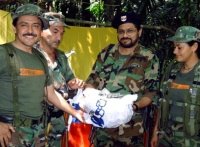Indictment of "Opror"

The Danish Minister of Justice Lene Espersen has decided to indict the spokesperson of the movement Opror ("Rebellion") for violating the Danish anti-terror legislation. After 9/11 2001 the Danish penal code has been expanded with the following article:
§ 114 b. Den, som i øvrigt ved tilskyndelse, råd eller dåd medvirker til at fremme den kriminelle virksomhed eller det fælles formål for en gruppe eller sammenslutning, som foretager en eller flere handlinger omfattet af § 114 eller § 114 a, nr. 1 eller 2, når virksomheden eller formålet indebærer, at en eller flere handlinger af denne karakter begås, straffes med fængsel indtil 6 år (The Danish Penal Code).
According to this article noone is allowed to incite to terror, or promote terror, by means of advice og help. Punishment for violation of the article may be up to 6 years behind bars.
In 2005 Opror collected money to the Colombian FARC guerillas and the Palestinian PFLP. FARC received some 50.000 Danish Kroners (about 8000 $). Some of the money was collected through the arrangement of a party and the income from this party. Opror has some 700 members, and during the party (in August 2005) a large number of people were aware that they paid for tickets, music, and drinks in support of FARC. Furthermore Opror has published an appeal on its website that encourages others to collect money for the organisations mentioned. This appeal has been removed by the police from the Opror website, but it can still be read on the website of the Danish Parliament as it is part of a question asked by a parliamentarian of the Unity List in Parliament. The view point of the Unity List and Opror is that the Danish state violates the principles of freedom of expression in the Danish constitution.
As a lot of people have been involved, and there is a principle of collective leadership in Opror, it does not seem to be an easy judicial case. By only indicting the spokesperson, this person is made the defendant of an act that hundreds of people have taken part in. The question may hence be asked: Why aren't all those responsible of supporting the FARC guerillas indicted?
It is well-known that the Danish government has been under pressure of the Colombian government, which has even asked for extradition of not only the spokesperson, but a large part of the members of Opror. It is conceivable that the Danish government has been under pressure from its close ally the United States of America. The Danish people are suffocating under the pressure of Big Brother. Before this embrace by Uncle Sam Danes could do solidarity work in 3rd world countries. They could collect money for freedom movements. A lot of people got involved. This is getting increasingly difficult in this stifling intellectual atmosphere.
It is obvious that this whole case has become a caricature of the functioning of the international judicial system after the 9/11 2001 strengthening of the terror legislation in a number of countries. The European Union has accepted blindfoldedly that a large number of organisations and movements have been placed on the terror list.
A lot of Danes are now fearful about collecting money to humanitarian organisations and freedom movements. Are the FARC guerilla fighters a freedom movement, or are they "terrorists". Perhaps they have been involved in acts that might be called terror, but so have American agents when they have been trying to effect regime change in Cuba and other places. Apart from that the FARC have a programme for societal change for the benefit of poor Colombian farmers, and the organisation is administrating large parts of Colombia in ways that most people would not categorise as terroristic. Danes are not allowed to support that work. This has been stressed by the Danish government by its pressing charges against Opror.

0 Comments:
Post a Comment
<< Home